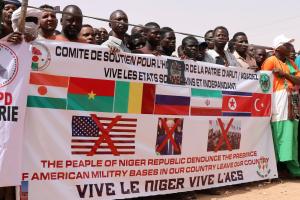BAR Book Forum: Nicholas Jones’s “Staging Habla de Negros: Radical Performances of the African Diaspora in Early Modern Spain”
“Behaving, talking, and sounding too black”—will never be separate from larger issues and questions of language and race.
“Black folks will always hack the systems of oppression and revel in black joy and wit.”
In this series, we ask acclaimed authors to answer five questions about their book. This week’s featured author is Nicholas R. Jones. Jones is Assistant Professor of Spanish at Bucknell University. His book is Staging Habla de Negros: Radical Performances of the African Diaspora in Early Modern Spain.
Roberto Sirvent: How can your book help BAR readers understand the current political and social climate?
Nicholas Jones: My book can help BAR readers understand our current political and social climates—both domestically in the United States and globally across the world—in its re-theorization of how we analyze, conceive, and deconstruct blackface performance via cultural appropriation. Staging Habla de Negros will also illuminate for BAR readers the complex history of Africans and their descendants in Iberia during the early modern period (1500-1700) that is not disconnected from our present times. As I problematize in the book’s Preface, and address in the Afterword, the racialized politics of language should also resonate with BAR readers. The topic of black expression—“behaving, talking, and sounding too black”—will never be separate from larger issues and questions of language and race.
Citation politics remain of extreme importance for my work in Staging Habla de Negros—which I contend possess profound political and social implications. In all of my scholarly work—whether a publication or a course syllabus—I always make a conscious effort to cite, engage, and highlight black women scholars, non-white scholars, and the intricate and vastly complex scholarly production of African diaspora studies. In my immediate field of early modern Iberian Studies this is quite a ballsy move. “Ballsy” because—and no Tea, no Shade— the field still has a long way to go. The fetishism and the seduction of treating Blackness (especially in literary studies) as an entity that needs to be rescued and saved from systemic White (i.e., the West; European) racism—along the lines of African-descended people's inferiority, pain, suffering—still dominates scholarly analyses and conversations about the so-called constructions, representations, and presences of black Africans in early modern archival documents, texts, paintings, etc. And by doing so, as a result, such interpretations end up privileging the very category of white supremacy that some folks have aimed to combat.
What do you hope activists and community organizers will take away from reading your book?
I hope that activists and community organizers recognize the powerful impact of my book’s “radical” frame and the close attention it gives to black women and black feminist reading practices. The “radical” allows me to not only theorize the significance of habla de negros language, but, more importantly, to arrive at a wider framework with which to theorize literary, cultural, and performative representations of black Africans in early modern Spanish texts. I employ the concept of “radical” to unabashedly account for this book’s methodology and theoretical framework: it privileges and utilizes Africana critical thought, black feminist theory, black performance theory, and critical race studies to analyze and discuss textual and visual representations of black Africans, in addition to equally valid and necessary conventional Western approaches, such as those informed by philology. As a scholar, whose work is deeply rooted in early modern Iberian Studies and Africana Studies, I enlist the strategies, methodologies, and insights of Africana Studies in the service of Early Modern Studies—and vice versa. In one sense, Staging Habla de Negros mobilizes corrective interventions to commonly held notions in Early Modern Studies and Africana Studies and, in another sense, the project theorizes a synthetic methodology for the Early Modern/Africana Studies discursive divide. Following Fred Moten, and echoing Audre Lorde and James Baldwin, I conclude by emphasizing my commitment to language and to the power of language in that I am reclaiming in Staging Habla de Negros—via the prisms of agency, subjectivity, the radical, and black performance—black language that has been made to work against images of blacks and their Blackness in early modern Spain
We know readers will learn a lot from your book, but what do you hope readers will un-learn? In other words, is there a particular ideology you’re hoping to dismantle?
Staging Habla de Negros dismantles the long-held belief by literary critics and linguists that white appropriations and representations of Africanized Spanish, or habla de negros language, is “racist buffoonery” or “racist stereotype.” The project calls for a specifically Black and gendered performance theory approach that challenges, revises, and radically reimagines the function, materiality, performance, and presence of black Africans’ bodily, sartorial, and linguistic Blackness in early modern Spanish cultural and literary studies. While acknowledging the compelling research conducted by previous scholars, the impact of my work revises the dominant discourse they have established. My goal here is to highlight the agentive subject positions of habla-de-negros speakers and to examine their voices as viable discourses. To be clear, Staging Habla de Negros is a political project. Over the course of its chapters, the book sets into motion a new scholarly precedent and trend that will place at the forefront a paradigm shift for scholars of Iberian Studies, Latin American Studies, and African diasporic studies. One-of-a-kind in this regard, the impact that I hope my work will have is that it will shed light on the recurring—not exceptional—instantiations where habla de negros texts showcase their black characters acting and speaking with agency and destabilizing the category of Whiteness—culturally, linguistically, and in terms of power relations—altogether.
Who are the intellectual heroes that inspire your work?
Herman L. Bennett, Dennis Britton, Daphne Brooks, Kinitra D. Brooks, Bruno Carvalho, Cécile Fromont, Michael Gomez, Miles P. Grier, Kim F. Hall, Aisha Khan, Jessica A. Krug, Henry B. Lovejoy, Jennifer Morgan, Matthew D. Morrison, Stephan Palmié, Gabriel Rocha, Cassander (Cassie) L. Smith, James H. Sweet, Kyla Wazana Tompkins, Zeb Tortorici, and David Wheat, among others.
Let’s consider three recent publications that immediately come to my mind: Herman L. Bennett's African Kings and Black Slaves: Sovereignty and Dispossession in the Early Modern Atlantic, Jessica A. Krug’s Fugitive Modernities: Kisama and the Politics of Freedom, and Danielle Terrazas Williams’s “My Conscience is Free and Clear’: African-Descended Women, Status, and Slave Owning in Mid-Colonial Mexico.” The study of black fugitivity, the politics of sub-Saharan African sovereignty, and black women is definitely where it’s at; where early African disapora studies (before the Enlightenment) is headed! As I have both aligned and situated my research agenda with their courageous, daring, and rigorous work, Staging Habla de Negros, too, takes cues from these intellectual heroes of mine to fearlessly argue that black folks will always hack the systems of oppression and revel in black joy and wit.
In what way does your book help us imagine new worlds?
I urge readers of Staging Habla de Negros to include Iberia in their mental ideations and cartographical narratives of the African diaspora. Part of my work here is to uncover the various ways in which white literary appropriations, mediation, and reconstructions of Africanized Spanish end up, in fact, privileging black African aesthetics, culture, and racial identifications in early modern Spain. To avoid static, homogenized notions of an essential “Africa,” habla de negros texts make Africa the starting point for the study of Africans in the diaspora, especially during the era of the slave trade.
Another new world that the book helps BAR readers imagine is that of black dances, conjure, and folklore. In chapter 1 of Staging Habla de Negros, I recognize an uncanny overlap between colonial Afro-Cuban folkloric performances and those portrayed in early modern Spanish habla de negros texts. A handful of musicologists and cultural critics have shown that during the seventeenth and eighteenth centuries, many dances of African influence appeared almost simultaneously at different points of the so-called Atlantic triangle, a region that comprised coastal cities of the Congo-Angola, Iberian Peninsula, and Latin America. In my close readings of theatrical works, for example, I employ the concepts of “conjure” and “conjuring” in order to advocate for, on the one hand, and to illuminate, on the other hand, the presence of what I like to call a “parasacred” reality that cannot be spliced from seculars modes of black expression and performance. Contrary to the assertion that literary texts cannot “prove” a relationship with ancestral styles, I maintain that for African diasporic peoples—both enslaved and free—the sacred and the secular are not separate(d). In sub-Saharan African cosmologies, there are no binaries nor separation of energies.
Roberto Sirvent is Professor of Political and Social Ethics at Hope International University in Fullerton, CA. He also serves as the Outreach and Mentoring Coordinator for the Political Theology Network. He is co-author, with fellow BAR contributor Danny Haiphong, of the new book, American Exceptionalism and American Innocence: A People’s History of Fake News—From the Revolutionary War to the War on Terror.
COMMENTS?
Please join the conversation on Black Agenda Report's Facebook page at http://facebook.com/blackagendareport
Or, you can comment by emailing us at comments@blackagendareport.com



















